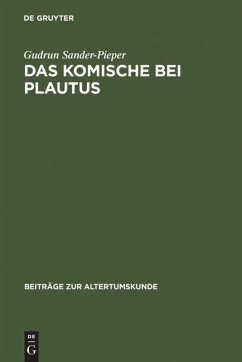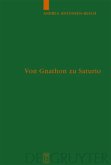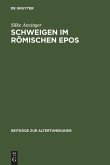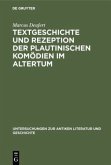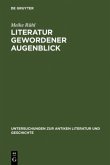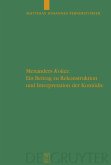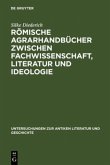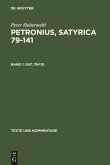This work is a comprehensive contribution on the dramatic comedy of the Roman comic playwright T. Maccius Plautus. From the starting point of a critical review of previous scholarship on Plautus and the most important works on dramatic comedy as a phenomenon in itself, the author develops her own model of the interplay between drama, comedy and tension. This principle, which can be applied to any other form of drama, is illustrated on the basis of cross-sections through passages of Plautusâ?? comedies and other European dramas, before finally being applied to Plautusâ?? Menaechmi as a whole. The central theme of the entire work is the particular use the Roman author made of structures of communication between the audience and the characters on stage.
Im Mittelpunkt dieser Plautus-Interpretation steht die Besonderheit Plautinischer Dramaturgie, die von der Autorin auf der Grundlage eines methodisch neuen Ansatzes erarbeitet wird. Ausgehend von den Leitgedanken einer seit über 2000 Jahren geführten Diskussion um das Phänomen des Komischen wird zunächst ein eigenes, in dieser Form noch nicht vorliegendes Strukturmodell dramatischer Komik entworfen. Nicht nach traditionell analytischem Verfahren, sondern weitestgehend textimmanent werden auf dieser Basis Einzelpassagen Plautinischer Komödien sowie die Menaechmi in ihrer Gesamtheit untersucht. Dabei zeigt sich, dass die für jede Komödie grundsätzlich relevanten Kategorien Wissensstrukturen zwischen Zuschauern und Bühnefiguren, Komik und Spannung, von jedem einzelnen Dramenautor individuell umsetzbar, bei Plautus in dramatisch besonders wirkungsvoller und kohärenter Form Anwendung finden, was als Plautinische Poetik bezeichnet werden kann. Die Studie bietet somit nicht nur zahlreiche Anregungen für die Plautus-Forschung, sondern die Untersuchung zum Phänomen der Dramatischen und Komischen überhaupt.
Im Mittelpunkt dieser Plautus-Interpretation steht die Besonderheit Plautinischer Dramaturgie, die von der Autorin auf der Grundlage eines methodisch neuen Ansatzes erarbeitet wird. Ausgehend von den Leitgedanken einer seit über 2000 Jahren geführten Diskussion um das Phänomen des Komischen wird zunächst ein eigenes, in dieser Form noch nicht vorliegendes Strukturmodell dramatischer Komik entworfen. Nicht nach traditionell analytischem Verfahren, sondern weitestgehend textimmanent werden auf dieser Basis Einzelpassagen Plautinischer Komödien sowie die Menaechmi in ihrer Gesamtheit untersucht. Dabei zeigt sich, dass die für jede Komödie grundsätzlich relevanten Kategorien Wissensstrukturen zwischen Zuschauern und Bühnefiguren, Komik und Spannung, von jedem einzelnen Dramenautor individuell umsetzbar, bei Plautus in dramatisch besonders wirkungsvoller und kohärenter Form Anwendung finden, was als Plautinische Poetik bezeichnet werden kann. Die Studie bietet somit nicht nur zahlreiche Anregungen für die Plautus-Forschung, sondern die Untersuchung zum Phänomen der Dramatischen und Komischen überhaupt.

